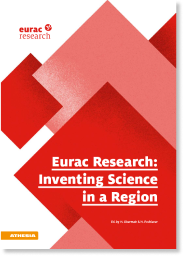Foreword
In retrospect, the province of South Tyrol’s founding of the then European Academy of Bozen-Bolzano, now Eurac Research, was a venture into cosmopolitanism. In the early 1990s, South Tyrol was still characterized by an extremely defensive attitude in politics as well as economy and society. The many years needed to implement the first phase of building up and expanding the autonomy of the Province strengthened the reflexes of the sentiment of having to defend oneself. This phase was defined by a political energy that was – quite understandably – caught up in fending off external influences, especially those which came from the south of Italy. However, the Settlement of Disputes before the United Nations in 1992 caused a sudden shift, and the region’s political energy was able to be directed in new ways to utilize the officially won freedom and protection of the status quo accordingly. A new awareness of the fact arose that there had long been a danger of encouraging isolationist tendencies by adopting a merely defensive stance. The regional stronghold was completed in the early 1990s, and the curtain wall surrounding it was supposed to be capable of withstanding all storms. Farsighted personalities from politics, business, culture, and administration recognized early on that the heavy and high castle walls could also produce opposite effects, which could casually be described as self-sufficiency and contentment in an insulated comfort zone. And likewise, it was recognized that innovation, education, and research, as well as internationalization, could be central to enabling qualitative and quantitative, but above all responsible growth. In a way, Eurac Research also stands for the fact that South Tyrol has succeeded in recognizing the dangers of the comfort zone, partially avoiding them and instead, striving for the passion zone. It was not necessarily in the founders’ intention to develop a large infrastructure, the vision of a platform for education and research was very modest for the time, and perhaps it was precisely this modesty that set the stage for the later rise of Eurac Research. If one had wanted great things from the start, perhaps hindered by fearful defense reflexes, this would have never succeeded, and so “Eurac”, as it is often abbreviated to, was able to develop splendidly under the radar, so to speak.
Eurac Research has certainly contributed to a normalization of, and a considerable professionalization in South Tyrol. This can also be seen in the topics, which in the first phase were still characterized by the conviction that one had to deal primarily with questions regarding the defense of the stronghold of South Tyrol, such as federalism, minority rights and bilingualism, even though it was precisely these topics which contributed to the international prominence of Eurac Research very early on; and all of this pleasantly complemented by the early recognition of a natural science topic such as Alpine environment, in current times of resource scarcity and climate change, one can now look back and realize the significance of this farsighted decision. Later, topics such as regional development, public management and tourism were added, which were already a reflection of a confident stride toward a autonomous regional development. This phase of Eurac Research’s development was very much characterized by solution-oriented cooperation with politics and administration at the provincial and municipal level, not least because the political elites were beginning to understand the increasing significance of backing up their decisions with evidence and research. And since the global storms of the times do not stop at South Tyrol and the realization is being made that heavy castle walls or a nationally and internationally anchored autonomy, are less and less the guarantor of bringing a region like South Tyrol into “new” times, Eurac Research is now increasingly dedicated to topics such as globalization, transformation and resilience.
Thus, it was the interdisciplinary nature of the research and the strong practical orientation of the topics that made Eurac Research so successful. Early on, the challenge of our leadership as well as the organization itself, was to define the subject matters in a solution-oriented manner to guarantee that researchers from different disciplines and subjects were able to work on them together. This required a lot of sensitivity in the composition of the research groups and an involved leadership style, which was and is the basis for the strong identity the Eurac family has. And thus, it was also possible to recruit employees from all over the world and to bring them to South Tyrol. The idea that the well-being of the people in the structure is the basis for pronounced commitment, i.e. the passion zone, was quickly established. Since the institutes, centers and service areas were managed de-centrally but controlled centrally – identity and corporate culture ensured crucially decisive joint action together with a convincing appearance both internally and externally.
30 years of Eurac Research means having contributed to making the “fortress” of South Tyrol more permeable, to the region’s acquiring of a sounding board, and to maintaining the possibility of looking into the mirror again and again with a due portion of willingness to reflect. The management of Eurac Research has not only become complex because the organization has reached a certain dimension, but also because institutional and legal framework conditions have changed, and sometimes rapid social developments have become apparent. But to lead such an organization, with the described corporate culture and team performance brings a lot of joy, since this is the only way in which the big challenges of the times can be mastered. In the future, it will take a lot of courage and humility to continue to develop the province of South Tyrol and thus Eurac Research in a sustainable and resilient manner.
Stephan Ortner
Director of Eurac Research
Eurac Research has certainly contributed to a normalization of, and a considerable professionalization in South Tyrol.
Stephan Ortner
